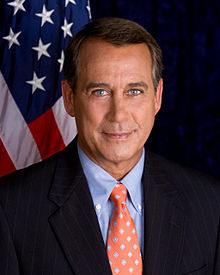Editor’s Note – From the official Blog of the Speaker of the House of the United States of America.
Out of Order: The White House’s Irrational Response on Executive Privilege
Posted by Brendan Buck and Kevin Smith – Boehner’s official Blog
Yesterday, House Oversight & Government Reform Chairman Darrell Issa (R-CA) sent a letter to the president pressing him to explain the basis for invoking executive privilege over Department of Justice documents requested as part of the Fast and Furious investigation. The letter states, in part:
“Courts have consistently held that the assertion of the constitutionally-based executive privilege – the only privilege that ever can justify the withholding of documents from a congressional committee by the Executive Branch – is only applicable with respect to documents and communications that implicate the confidentiality of the President’s decision-making process, defined as those documents and communications to and from the President and his most senior advisors. Even then, it is a qualified privilege that is overcome by a showing of the committee’s need for the documents. The letters from Messrs. Holder and Cole cited no case law to the contrary.”
In legal decisions on the scope of executive privilege during the Bush and Clinton administrations, judges consistently ruled that executive privilege does NOT extend to Cabinet level officials or their staffs. As the DC Circuit Court wrote in 2004 in its Judicial Watch, Inc. v. Department of Justice decision, “communications of staff outside of the White House in executive branch agencies that were not solicited and received by such White House advisors could not [be covered by executive privilege].” Also, as noted in this CRS report, the DC Circuit Court ruled in 1997, “the presidential communications privilege should never serve as a means of shielding information regarding governmental operations that do not call ultimately for direct decision-making by the President.”
The White House appears to know this. This morning, White House spokesman Eric Schultz responded to Chairman Issa’s letter by saying, “the Courts have routinely considered deliberative process privilege claims and affirmed the right of the executive branch to invoke the privilege even when White House documents are not involved.” [emphasis added]
But the president didn’t assert “deliberative process privilege” – he asserted executive privilege, which is reserved to protect internal White House decision-making. When presidents have asserted it over other executive branch documents and communications, either courts have ruled those claims to be invalid and ordered them overturned OR the White House has relented and provided Congress with the documents that were requested.
So where does that leave its claim of executive privilege? The White House – through interviews with the president and statements made by White House staff – has consistently denied any knowledge of facts surrounding the Fast & Furious operation or the death of U.S. Border Patrol Agent Brian Terry. But Republicans never suggested the White House was involved. That’s why the president’s assertion of executive privilege was so surprising and troubling, and why Speaker Boehner said last week that the decision to invoke executive privilege is “an admission” that White House officials were involved in some way. After all, if the White House wasn’t involved, why would it assert executive privilege?
There are two – and only two – explanations: either the documents requested will show White House involvement in the fallout and cover-up of the operation – or the president’s executive privilege claim is frivolous. As Issa’s letter explains:
“Accordingly, your privilege assertion means one of two things. Either you or your most senior advisors were involved in managing Operation Fast & Furious and the fallout from it, including the false February 4, 2011 letter provided by the Attorney General to the Committee, or, you are asserting a Presidential power that you know to be unjustified solely for the purpose of further obstructing a congressional investigation. To date, the White House has steadfastly maintained that it has not had any role in advising the Department with respect to the congressional investigation. The surprising assertion of executive privilege raised the question of whether that is still the case.”
So which is it?
Back in 2007, then-Senator Obama clearly didn’t think that asserting executive privilege was a matter of “principle.” Something in the documents the White House is now hiding from disclosure seems to have changed his mind. Unless the administration cooperates before Thursday, a vote of contempt is necessary so the House can continue its efforts to find out the truth and provide answers for the family of U.S. Border Patrol Agent Brian Terry.


